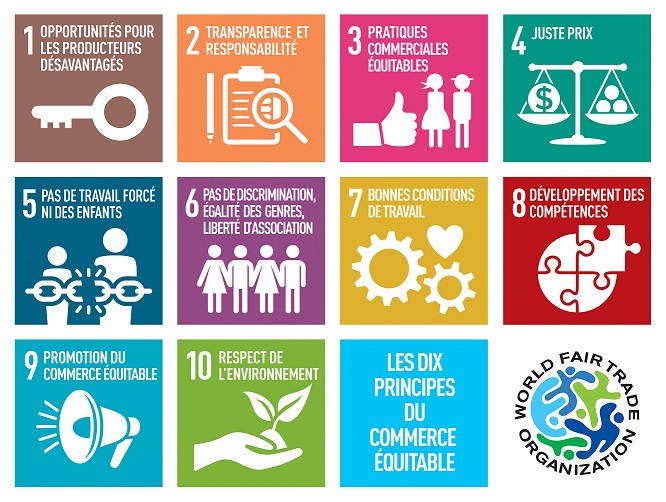Fair trade is an approach that seeks to promote fairer and more equitable trade relations between producers in poor countries and consumers. However, this approach has both advantages and disadvantages. In this article, we will examine the advantages and disadvantages of fair trade for both the consumer and the producer, in order to better understand its benefits and limitations in building a more equitable and sustainable trade system.
What are the advantages of fair trade?
Fair trade is a very effective way to combat the inequality that exists between highly developed countries and developing countries. Its advantages are numerous and manifest at different levels. Here are some general examples:
Local development: Fair trade contributes to local economic development by encouraging the production and sale of products from disadvantaged or marginalized communities by the conventional globalized trade system. It supports local artisans as well as small producers to improve their incomes and provide them with financial stability, which in turn supports the local economy.
Fair working conditions: This trade cares about workers' rights. It aims to end the inequalities and injustices that workers face and to fight against their exploitation while ensuring safe working conditions that respect international labor standards, such as the prohibition of child labor and the guarantee of decent wages.
Environmental sustainability: Among the challenges that fair trade focuses on significantly is encouraging producers to use environmentally friendly production practices. This includes transitioning to organic farming, preserving ecosystems, and reducing the use of harmful chemicals.

What are the advantages of fair trade for the consumer?
Fair trade also offers several advantages to consumers. For example:
Quality products: Producers participating in fair trade are encouraged to adhere to strict production standards, resulting in high-quality products. At Biovie, you can find organic sliced tiger nuts, whole organic tiger nuts, or raw cashew nuts from fair trade.
Traceability: Consumers can trace the origin of the products they buy and know the conditions under which the product was made. This builds trust and transparency between the producer and the consumer.
Positive social impact: By choosing fair trade products, consumers contribute to initiatives aimed at improving the living conditions of producers, reducing poverty, and promoting fairer trade relations.
Awareness and education: Fair trade also offers consumers the opportunity to learn more about the challenges faced by producers in developing countries. By learning about fair trade practices, consumers gain the satisfaction of knowing they are contributing to positive change through their purchasing choices.
What are the advantages of fair trade for the producer?
Fair trade offers several advantages to producers, especially in developing countries. Here are some key advantages for these producers:
Fair Price: By encouraging local producers to produce more, it allows consumers to buy the product at a fair price and the producer to earn more. Thus, fair trade guarantees producers fair prices for their products and equitable remuneration.
Market Access: Thanks to fair trade, producers have direct access to international markets, which allows them to establish sustainable business relationships with importers or fair trade organizations, expand their customer base, and diversify their commercial outlets.
Skill Development: Fair trade promotes the strengthening of skills and the empowerment of producers. Fair trade organizations often provide technical support to producers, training dedicated to the use of chemicals to avoid health risks, and management advice. This allows producers to improve their production techniques, which can stimulate their long-term development.
Profit Sharing: Fair trade encourages the democratic participation of producers. They are often members of cooperatives or fair trade organizations, which allows them to participate in decision-making and share profits. This strengthens their voice and influence in the production, marketing, and distribution processes. These benefits enable producers to escape poverty, strengthen their autonomy, and build a more sustainable future for their communities.

Why Buy Fair Trade Products?
- Buying fair trade products helps encourage social justice by giving producers their fair remuneration. This initiative allows them to improve their living conditions and live with dignity on a respectable salary, which helps reduce economic inequality.
- Fair trade supports marginalized communities and small farms. It helps small producers like farmers to escape poverty, which has a positive impact on society by creating new jobs and improving social services in these communities.
- Fair trade helps combat child labor. Many children are faced with forced labor in fields and agricultural environments, which could endanger their schooling and deprive them of education and knowledge. This is why fair trade aims to restore their right to education and protect them.
- Fair trade products are often grown or made using environmentally friendly practices. This involves limiting the use of harmful chemicals, GMOs, and pesticides to preserve the health of workers, consumers, and ecosystems. By choosing to buy these products, you support sustainable production practices and contribute to environmental protection, while benefiting from high-quality products thanks to the importance producers place on artisanal production.
What is the Impact of Fair Trade?
Fair trade has a significant impact on producers, local communities, consumers, and the environment:
- Improvement of producers' living conditions and strengthening of their economic security.
- Strengthening local communities by supporting small farms, local artisans, and cooperatives, which bolsters local economies.
- Fair trade promotes fairness and equal opportunities. It fights against worker exploitation, prohibits child labor, highlights women's work, and guarantees decent working conditions.
- Encouragement of sustainable production practices to protect the environment.
- Raising consumer awareness of the challenges faced by producers in developing countries, to foster greater consciousness and responsibility in their consumption choices.
What are the disadvantages of fair trade?
Like any practice that has its advantages, there are always some disadvantages in return. Here are some of the main disadvantages associated with fair trade:
Limited reach: Fair trade products are not yet available in all global markets despite its continuous growth, which is why its impact on global economic inequalities remains limited.
Higher cost: Fair trade products are generally more expensive because they are quality products that require a certain method of production and better compensate producers. This can make these products less accessible to consumers and less attractive due to their price.
Logistical complexity: Given the quality of products made by producers, they may face more complex rules in terms of certification, verification of standards, and quality controls, which can add additional challenges for these producers. This complicates their task and can lead to additional costs and obstacles to the participation of small producers.
Relative environmental impact: To ensure the transport of goods, the use of maritime and road transport is mandatory, which involves the use of large quantities of oil and therefore greenhouse gas emissions.
Lack of product diversification: It is clearly noticeable in fair trade that the products that are strongly present are certain food products (like coffee), followed by artisanal and clothing products. This lack of diversification impoverishes the market for these very interesting products, which many buyers would like to find more often with the fair trade label.







